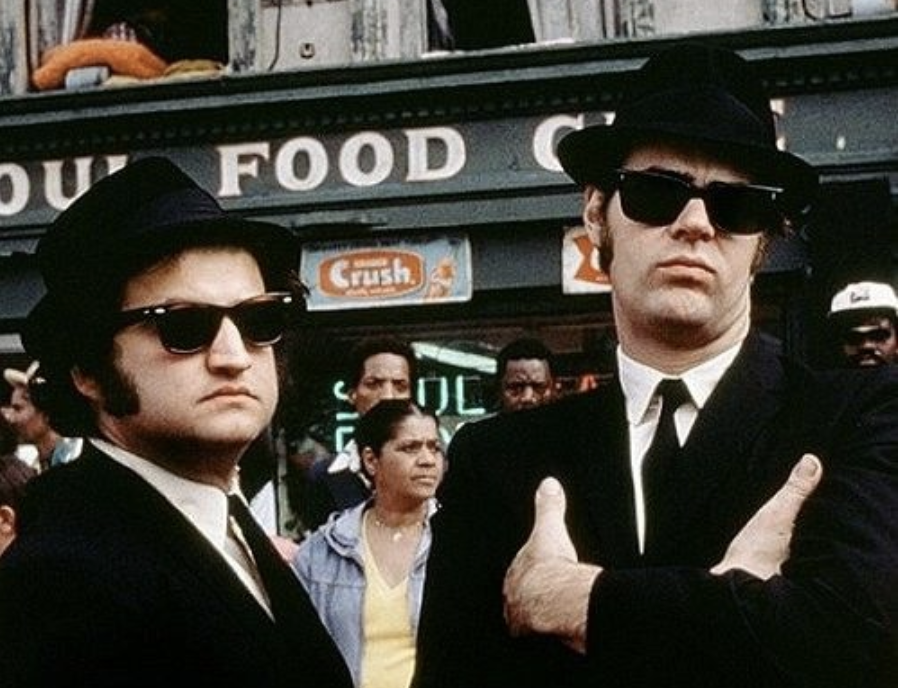In the swearing of a solemn oath this morning, all but a few U.S. Senate Republicans were undoubtedly lying in their hearts, lying to their constituents. lying to their children and lying to God: “Do you solemnly swear that in all things pertaining to the trial and impeachment of Donald John Trump, President of the United States and now pending, you will do justice according to the Constitution and laws, so help you God?” They all muttered “I will” or “yeah” or “yo, whatevs.”
 Jeffrey Wells
Jeffrey Wells
Persistence, Defiance
In a piece called “The 2020 Oscar Nominees for Best Picture Reveal White Men in a State of Rebellion“, Indiewire‘s Anne Thompson notes that “we’ve all read the commentaries on the Academy’s shortcomings when it comes to diversity.” But the main problem, she feels, is the presence of too many over-60 white guys.
“What’s revealing is the movies the 8,500 voters actually nominated for Best Picture,” she says. “It reminds us of who these industry insiders are: Mostly white males over 60, many of whom vote with their own taste rather than consider what they might be missing.
“The Academy has raised the percentage of people of color to 16, international members to 20, and women to 32. However, the white men who dominate the voting body are clearly responding in kind. Last year, they defiantly resisted criticisms of Green Book and voted for it anyway.”
You know what that sounds like? Mitch McConnell‘s remark about Elizabeth Warren‘s strong objection to Jeff Sessions‘ nomination as Attorney General. McConnell: “Senator Warren appeared to violate the rule. She was warned. She was given an explanation. Nevertheless, she persisted.”
For the 57th time, Green Book‘s Best Picture Oscar was partly about the supplying of humanity, heart, discipline, believable characters and craft. But a significant and possibly decisive factor was the decision by Green Book admirers to tell twitter scolds to go fuck themselves. And that they did. And for a few minutes on the night of 2.24.19 the world knew a certain kind of joy. Not because Green Book is a masterpiece, but because Khmer Rouge wokesters were handed their walking papers.
Indisputable
Complex behaviors, hubris, machismo, tribalism, hair-trigger temperaments, mutual animal dislike, self-destructive personality traits — a whole lot going on here. Which is one reason why everyone agrees that this Irishman scene is (a) among the finest in this 209-minute film, and (b) one of the best of the year in any film. The only other Best Picture nominee that comes close to delivering on this level is Marriage Story. The other seven — 1917, Ford v Ferrari, Jojo Rabbit, Joker, Little Women, Once Upon a Time in Hollywood, Parasite — don’t. They don’t have anything that even approaches it. Certainly not in terms of character complexity and surging undercurrents. I’m sorry but that’s the truth.
“Little Women” Truth Bomb
Sasha Stone‘s “Oscar Primer — Why No Women Were Nominated for Best Director“, posted on 1.16, is essential reading. It does an excellent job of analyzing the whole notion of “Greta Gerwig and Little Women were screwed over by industry sexism, as evidenced by a lack of a Best Director Oscar nom.” And it points a finger at Gerwig’s water-carriers — i.e., wokester critics.
The piece is brilliant and definitive from start to finish, but here’s my favorite portion:
“Many critics did everyone a disservice by not being completely honest about Little Women. By and large, they went overboard for it, giving it a 95% score on Rotten Tomatoes with only a few brave voices of dissent endeavoring to describe what the film is and isn’t.
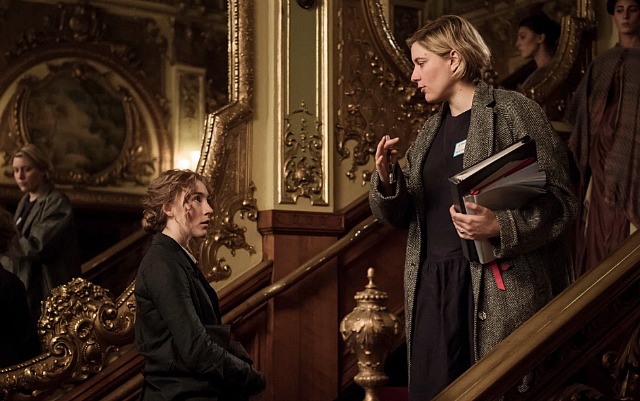
“Yes, it’s beautiful, lush, alive, and funny in places. But for many [Little Women] is also a structural disaster. Unless a viewer is familiar with the story, the rearranged timeline often causes confusion, and many will have trouble keeping their bearings. Even for those of us who accepted the task of putting the puzzle together, we had to wonder what purpose it served.
“You heard no qualms about this from major film critics because they were swept up in the idea that ‘Gerwig was back’ and no one wanted to dampen that enthusiasm. When critics addressed it at all, they would explain away the approach with a variety of rationales that fail to convince a lot of us, That said, congratulations to all the fans of Little Women who had fun solving the Rubik’s Cube. Now solve the mystery of why you’re so furious at anyone who wishes the plotline had been more straightforward.
“Those who love the film aren’t bothered by the ornate structural affectation. They love it anyway. Obviously, at least 350 Oscar voters loved it too. But the very real issue is clearly not something that a large number of voters were willing to overlook when they weighed a convoluted film on the one hand against 10 or 12 other other films that flowed seamlessly across the screen with such propulsive narrative thrust.
“In fact, it’s hard not to suspect that the reason a lot of voters named Little Women on their ballots was because they felt it was their duty, because Gerwig is a woman. Would a Best Director nomination bestowed on those terms even be fair to Gerwig? Nope.
“Blues” Bloat, Nose Candy, etc.
2020 marks the 40th anniversary of John Landis’ The Blues Brothers (‘80), allegedly one of the biggest and most unmitigated cocaine movies ever made. HE is trying to recall other significant cocaine flicks of that era. Martin Scorsese’s New York, New York, for sure. Let’s try and come up with a fairly comprehensive list. The HE community can do this!
It’s also worth recalling, I think, the elephant-fart aroma that this film spread across the land. It was a comedy, of course, and so a certain raucousness was unavoidable. But it was also about a couple of Paul Butterfield-like devotees of Chess records, Muddy Waters and Howlin’ Wolf. Poseurs, certainly, but sincere about it. Guys who’d responded to the heart, ache and grit of the Chicago blues and were looking to spread the gospel, so to speak. On SNL and in live shows John Belushi and Dan Aykroyd‘s Blues Brothers act was funny and cool, but when Landis stepped in it all turned brazen and soul-less — over-produced, over-scaled, over-emphasized.
From Janet Maslin’s 5.20.80 N.Y. Times review: “There isn’t a moment of The Blues Brothers that wouldn’t have been more enjoyable if it had been mounted on a simpler scale. This essentially modest movie is reported to have cost about $30 million, and what did all that money buy? Scores of car crashes. Too many extras. Overstaged dance numbers. And a hollowness that certainly didn’t come cheap.
“A film that moved faster and called less attention to its indulgences might never convey, as The Blues Brothers does in all but its jolliest moments, such unqualified despair.”
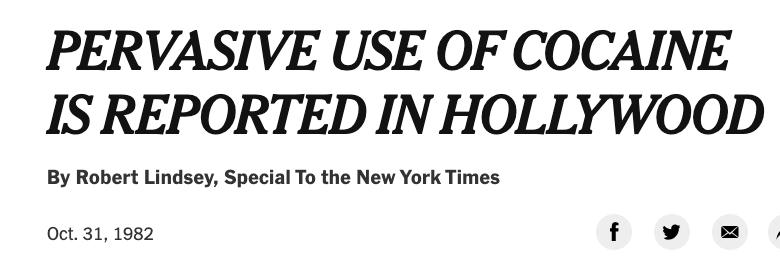
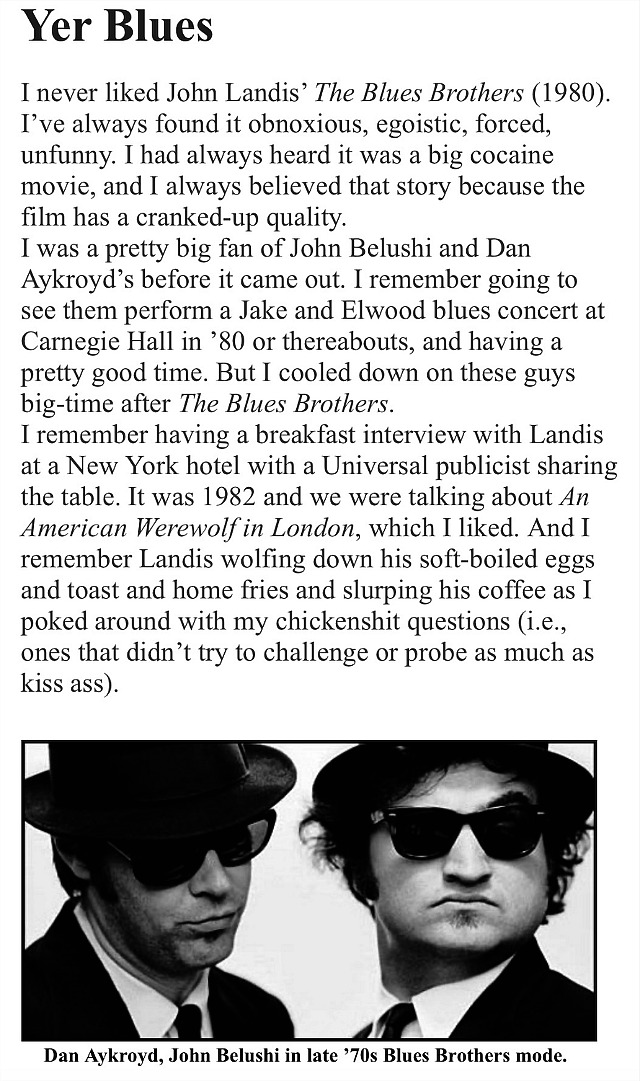
Bombshell: Parnas Spills It All
“I am betting my whole life that Trump knew exactly everything that was going on that Rudy Giuliani was doing in Ukraine.” — Lev Parnas to N.Y. Times reporters Kenneth P. Vogel and Ben Protess and to MSNBC’s Rachel Maddow, spilling his guts under pressure from prosecutors for the Southern District of New York.
And Senate Republicans are going to continue to dismiss, deny, dispute…clasping their monkey hands over their monkey eyes, ears and mouths.
Name Game
Spell your first name with movies you’ve watched a few times and wouldn’t mind watching again. Oh, wait…nobody on Hollywood Elsewhere uses their real name so they I guess they can’t play.
J[ackie Brown]
E[xorcist]
F[atal Attraction]
F[ield of Dreams]
R[ear Window]
E[lle]
Y[oung Frankenstein]
W[hite Heat]
E[ast of Eden]
L[ady Eve]
L[ast of Sheila]
S[aboteur]
The Die Is Cast
Yesterday’s news: Before signing the two articles of impeachment and sending them to the Senate, House Speaker Nancy Pelosi threw some Irishman shade upon The Beast’s request for Ukrainian President Volodymyr Zelensky to “do us a favor”. But she didn’t bring it home.
“Do me a favor?” said Pelosi. “Do you paint houses too? What is this? Do me a favor?”
She could have added, “President Trump has been impeached by the House of Representatives, and there’s no stain remover for that. It’s what it is. We know how some Republicans feel about him. We know. But either way and no matter what they say or do, he’s goin’.”
Bocca
I was in the checkout line at Ralph’s on Carillo. A giggly party girl and her friends were buying four huge bottles of something alcoholic. Either the booze was pale yellow or the bottles were tinted that way. Didn’t see a label or sticker.
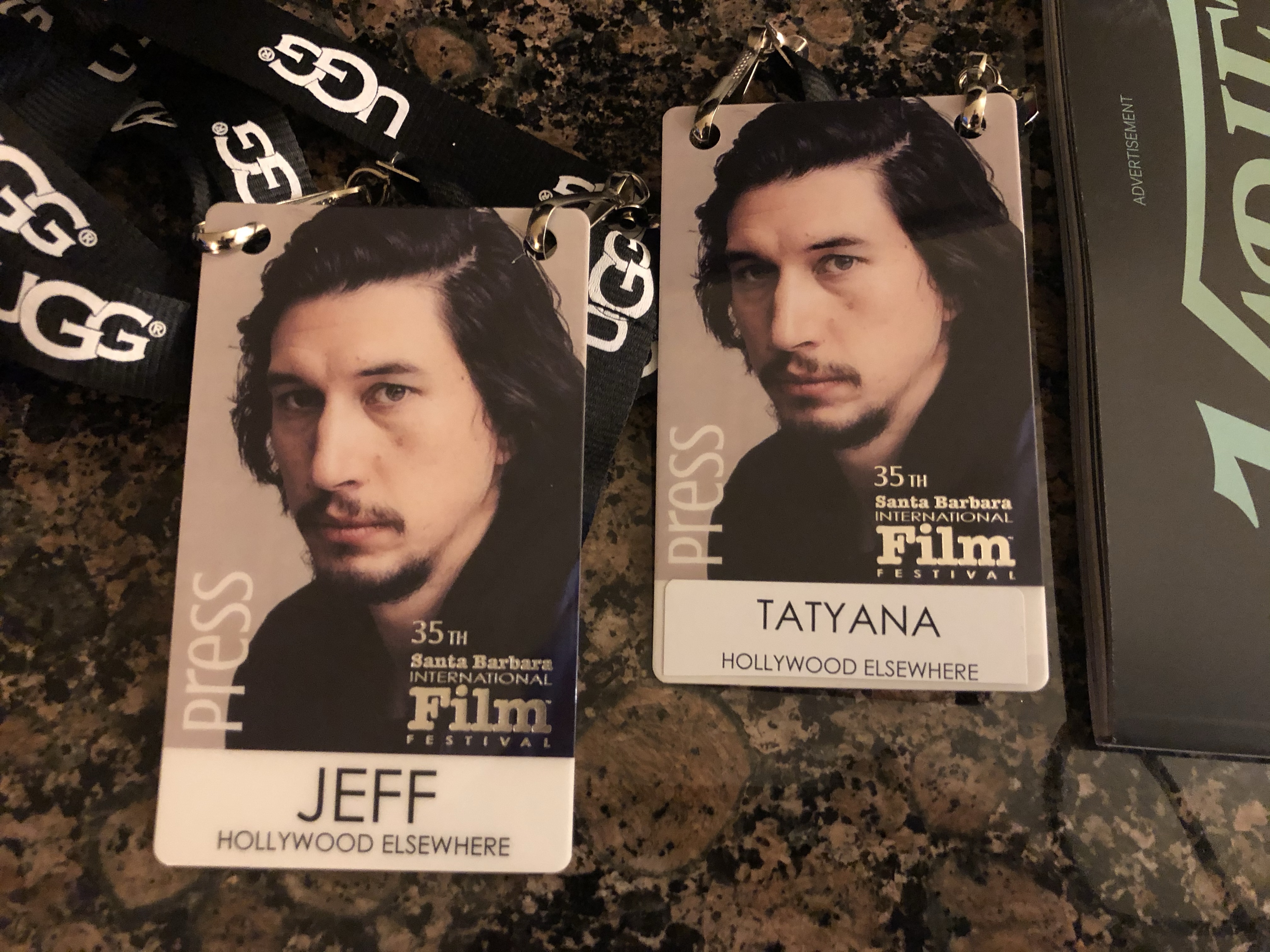
Rumble Meets The Road
When it comes to rumblehog journeys, I prefer tidy two-lane blacktops. Winding my way through traffic along the major boulevards is almost kind of fun (and I certainly love being able to get places faster than anyone else) but I’m not a fan of freeway driving, especially when the trip requires two-plus hours of sustained concentration. There are too many careless, impulsive lunatics out there, and a lot of them are texting.
This is nonetheless my plan for getting up to Santa Barbara this afternoon. I guess I’ll just hug the right lane and hope for the best. I’ll be leaving around 1:30 pm. Bundled up. Out of commission until I arrive at the Santa Barbara Inn.
Case of the Two Dolls
The last time I checked producers, directors and screenwriters were regularly engaging in the alleged theft of ideas. By “theft’ I mean they’ve routinely been influenced by (i.e., impressionistically borrowed from or vaguely ripped off) other films, TV series, plays, etc. Welcome to a business known for a rough-and-tumble approach to creativity.
One of the dominant Hollywood legends is that you can’t make it in this town without strong feral instincts. If you want to succeed, according to this belief, you have to be a wolf. Every so often you need to drive up to Mulholland Drive at midnight, stare at the stars and go “owwwwoooohhhh…whoo-whoo-whooooo!”
This morning Francesca Gregorini, 51 year-old director of 2013’s The Truth About Emanuel, filed a copyright infringement suit on Wednesday against M. Night Shyamalan and Apple, accusing them of “bastardizing her 2013 film and re-envisioning it through a male gaze,” according to a Variety account. The suit refers to Shyalaman’s Servant, although the writer is Tony Basgallop, who ironically is also 51.
I’ve never seen The Truth About Emanuel (has anyone?) but it’s a psychological thriller about a woman who forms a relationship with a doll after the death of her infant child. Shyamalan and Basgallop’s Servant is about a couple raising a doll after suffering the death of a baby.
Lawsuit quote: “If Servant showcases anything, it is the gender arrogance and inequity still infecting Hollywood (and apparently Cupertino). The result of this caricature of the male gaze is the utter bastardization of Ms. Gregorini’s work. It’s an apt metaphor for the real-life version of what could happen here: It takes only a few old guard Hollywood men, such as Mr. Shyamalan and Mr. Basgallop, and their new Silicon Valley partner Apple TV+, to negate the considerable achievements and life experiences of the women behind Emanuel, and to irredeemably tarnish their work.”
As noted, copyright infringement and the alleged stealing of original ideas is a common practice and an old beef. Gregorini is using the political jargon of the moment to enhance her case. What else?
Megxit Aftermath
On 1.8 Meghan Markle (the Duchess of Sussex) and Prince Harry (Duke of Sussex) announced they would step down as “senior” British royals. Because Meghan had decided she couldn’t handle being called a shameless opportunist and Kardashian wannabe by the British tabloids. Markel quote: “When I first met my now-husband, my friends were really happy because I was so happy, but my British friends said to me, ‘I’m sure he’s great, but you shouldn’t [do this] because the British tabloids will destroy your life.'”
What did Markle think would happen when she and Harry decided to marry? That the British tabs would respect boundaries? Empty as the whole British Royal charade is, it’s a responsibility that Markle accepted when she agreed to be Mrs. Harry. And now they want to parade around, spend half their time in North America and presumably make money off their fame. Perhaps Meghan may even try to resuscitate her acting career. Megxit reminded me of Sarah Palin‘s decision to quit the Alaska governorship, which was all about salivating over big money.

